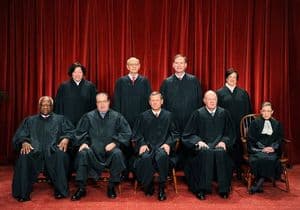In Burwell v. Hobby Lobby, the Supreme Court's conservative majority allowed a large swath of for-profit companies to deny contraception to their female employees. Hobby Lobby, a national chain of arts and crafts stores, is a privately held, for-profit company that is run by a religious family. It's not a church. Nor is it a religious-based organization. It is simply a company that happens to be owned by religious people, but employs about 21,000 of varying beliefs. The owners objected to the part of Obamacare that required employers to provide health insurance that includes access to certain forms of contraception. They challenged that requirement and won, leaving the Supreme Court with a decision that declared that Hobby Lobby was a "person" entitled to the religious rights of persons.
We discussed the details of that decision here, in Part 1 of this three-part series on Hobby Lobby. In Part 2, I discussed how the Supreme Court actually made Hobby Lobby worse! For now, let's put aside our understandable anger at a decision that discriminates against women, denies necessary health care to those who need it, abuses precedent, and bloats religious freedoms to dangerous levels.
Hobby Lobby was a confusing decision and it is worth discussing it again not only so we can all understand it, but so we can fully appreciate its potential effects on the LGBT community. The ruling discussed religious freedom, which is enshrined in the First Amendment, but it was really based on a statute passed by Congress called the Religious Freedom Restoration Act (RFRA) (as if religious freedom needed to be restored). It talked about corporations deserving the freedoms of persons, but it never fully explained if corporate personhood applies to everything or just certain freedoms and rights. Then, after going out of its way to explicitly narrow and cabin the decision to very specific situations, the Court majority did an about-face the next day, possibly expanded the scope of the decision, and admitted to the American people that, sometimes, the majority's words are just words, nothing more.
The decision did a lot of damage. So much damage, in fact, that Democrats in Congress are introducing legislation to overturn the decision. Speaker Boehner's conservative majority in the House is never going to bring the bill to the floor; the act of introducing the bill of pure (and great) politics. But to most of us, the entire scenario begs the question: How can Congress introduce a bill aimed at overturning a Supreme Court decision?
AFTER THE JUMP, I delve into the legal background of the Hobby Lobby decision so we can see how the case was decided and how legislation could fix it.
 Writing for a 5-justice majority, Justice Samuel Alito found that requiring all employers to provide contraception health care coverage for their employees substantially burdened the religious liberties of employers who believe that contraception violates their religious beliefs. In passing RFRA, Congress stated that no federal law should "substantially burden" a person's freedom to exercise his or her religion. And since the law often employs the shorthand tool of considering corporations like persons — traditionally, for the purposes of being sued and using the court system — the Court said that corporations enjoy the same rights as persons under RFRA.
Writing for a 5-justice majority, Justice Samuel Alito found that requiring all employers to provide contraception health care coverage for their employees substantially burdened the religious liberties of employers who believe that contraception violates their religious beliefs. In passing RFRA, Congress stated that no federal law should "substantially burden" a person's freedom to exercise his or her religion. And since the law often employs the shorthand tool of considering corporations like persons — traditionally, for the purposes of being sued and using the court system — the Court said that corporations enjoy the same rights as persons under RFRA.
Hobby Lobby, then, was a decision based on a statute about religious freedom. It was not, strictly speaking, based on the First Amendment's guarantee of the free exercise of religion, although it was certainly mentioned and it certainly played a role.
A little bit of history. Sometimes, laws and regulations conflict with individual rights. When they do, it is common for courts to balance the burdens caused against the compelling need for the law. Regular readers of Towleroad will see hints of what we have been calling "strict scrutiny" in that balancing test, but that is a longer discussion for another time. This balancing of freedom and compelling need was what the federal judiciary used to do when it came to laws that had the indirect effect of conflicting religious freedom. So, for example, states have laws requiring children attend school until at least the age of 16. The Amish of Pennsylvania have a different set of beliefs, one that requires children to begin work and their dedication to Amish values long before 16. The Pennsylvania school attendance law conflicts with Amish religious liberty. When this case came before the Supreme Court, the justices balanced religious freedom and the state's compelling interest in education and found that the state could not force the Amish children to attend school.
Then, a man in Oregon was fired from his job for smoking peyote (a drug) even though peyote use was part of his religious experience as a member of the Native American Church. In 1990, the Court dropped the balancing test and found that generally applicable laws — or laws that apply to everyone and do not single out a particular religion or group for discrimination — need not have a "compelling state interest" to limit religious freedom. In the Oregon case, the law was that you cannot collect unemployment benefits if you were fired from your job for committing a crime, i.e., smoking a controlled substance. The state no longer had to meet a heavy burden to keep that law in place under the Constitution.
Congress reacted to this decision (Employment Division v. Smith) with RFRA, which said that even generally applicable laws cannot substantially burden a person's religious liberty. If they do, the only way they could pass Constitutional muster was if there was a compelling need for the law and the law was the narrowest it could be.
Think of RFRA as giving meat to the First Amendment's guarantee of religious liberty. Giving the basic requirement of the First Amendment, courts could use the balancing test (and give religious liberty a leg up) or it could use the standard from Smith (and allow regulations to win out). The Constitution is silent on the particular standard. So, Congress passed RFRA to mandate a standard.
 If Hobby Lobby was based on RFRA, then if Congress did not like the way Hobby Lobby came out, it could do any of several things.
If Hobby Lobby was based on RFRA, then if Congress did not like the way Hobby Lobby came out, it could do any of several things.
It could change or clarify RFRA. It could say that, in fact, RFRA does not apply to corporations. The word "person" in the statute could be defined to explicitly exclude all types of corporations, some types of corporations, or just a few.
Congress could also simply remove RFRA from the health care arena. In the Senate, Democratic Senators Patty Murray of Washington and Mark Udall of Colorado have introduced legislation prohibiting discrimination against female employees in the provision of any health care coverage guaranteed under federal law and explicitly prohibits the use of any other federal law (read: RFRA) to exempt employers from that requirement.
Congress could mandate that the federal judiciary return to the weaker standard employed in Employment Division v. Smith and bury the balancing test. This could have the broadest impact by far because it would go beyond the narrow confines of health care and contraception and apply to all generally applicable laws that could burden religious liberty. Those laws could include public accommodations laws that prohibit bakers, florists, restaurant owners, shopkeepers, and others from discriminating on the basis of sexual orientation.
***
Follow me on Twitter and on Facebook. Check out my website at www.ariewaldman.com.
Ari Ezra Waldman is a professor of law and the Director of the Institute for Information Law and Policy at New York Law School and is concurrently getting his PhD at Columbia University in New York City. He is a 2002 graduate of Harvard College and a 2005 graduate of Harvard Law School. Ari writes weekly posts on law and various LGBT issues.




